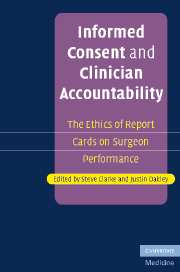Book contents
- Frontmatter
- Contents
- List of contributors
- Acknowledgements
- Introduction: Accountability, informed consent and clinician performance information
- Part I Accountability
- Part II Informed consent
- Part III Reporting performance information
- Part introduction
- 13 Is the reporting of an individual surgeon's clinical performance doing more harm than good for patient care?
- 14 Examining the link between publicly reporting healthcare quality and quality improvement
- 15 Hospital and clinician performance data: what it can and cannot tell us
- 16 An ethical analysis of the defensive surgery objection to individual surgeon report cards
- 17 Surgeon report cards and the concept of defensive medicine
- 18 Training, innovation and surgeons' report cards
- 19 Doctors' report cards: a legal perspective
- Index
Part introduction
Published online by Cambridge University Press: 08 August 2009
- Frontmatter
- Contents
- List of contributors
- Acknowledgements
- Introduction: Accountability, informed consent and clinician performance information
- Part I Accountability
- Part II Informed consent
- Part III Reporting performance information
- Part introduction
- 13 Is the reporting of an individual surgeon's clinical performance doing more harm than good for patient care?
- 14 Examining the link between publicly reporting healthcare quality and quality improvement
- 15 Hospital and clinician performance data: what it can and cannot tell us
- 16 An ethical analysis of the defensive surgery objection to individual surgeon report cards
- 17 Surgeon report cards and the concept of defensive medicine
- 18 Training, innovation and surgeons' report cards
- 19 Doctors' report cards: a legal perspective
- Index
Summary
Reporting performance information
Surgeon performance information has been collected, tabulated and publicly reported since the early 1990s, first in New York State and then in other American States, and now in the United Kingdom. Performance information on surgical units and on hospitals has been collected for some time before this, but the public release of such information is a relatively recent phenomenon, as are report cards on the performance of individual surgeons and certain other clinicians. In this final section of the collection we turn our attention to the ‘report cards movement’ itself, with chapters examining a variety of issues that have emerged in studies of the impact of report cards on the performance of hospitals, units and individual surgeons.
Our first chapter in the section, by Silvana Marasco and Joseph Ibrahim, examines the impact of public reporting of surgeons' performance on patient care. The authors consider, in some detail, the impact of cardiac surgeon report cards on the quality of cardiac surgery, on cardiac patients and on cardiac surgeons and other stakeholders, particularly in light of the US experience with report cards on individual cardiac surgeons. Rachel Werner and David Asch also examine evidence of the impact of public reporting on the quality of health care services. They argue that existing US public reporting initiatives have not been conclusively shown to improve healthcare quality, and indeed, that there is some evidence that public reporting has various unintended negative consequences for patient care.
- Type
- Chapter
- Information
- Informed Consent and Clinician AccountabilityThe Ethics of Report Cards on Surgeon Performance, pp. 195 - 196Publisher: Cambridge University PressPrint publication year: 2007



